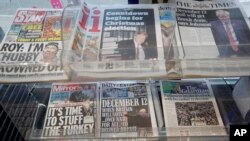British Prime Minister Boris Johnson and opposition Labour Party leader Jeremy Corbyn traded barbs over Brexit and public spending Wednesday as campaigning unofficially kicked off for the country's crucial yet unpredictable Dec. 12 general election.
The Conservative and Labour leaders honed their pitches to the public while speaking during the House of Commons' weekly Prime Minister's Questions session, the last before Parliament is suspended for the five-week election campaign.
"This election is a once-in-a-generation chance," Corbyn said. "People have a chance to vote for real change after years of Conservative and Lib Dem cuts, privatization and tax handouts for the richest."
Johnson agreed "that there is a stark choice facing this country."
He said the choice was between "getting Brexit done and ending the dither and the delay" if the Conservatives won, and "economic catastrophe under the Labour Party."
The partisan peacocking came a day after the House of Commons approved an early election that politicians hope could break the deadlock over Britain's stalled departure from the European Union. The date will become law once it is approved later Wednesday by the unelected House of Lords, which doesn't have the power to overrule the elected Commons.
The looming national vote comes 2 1/2 years before Britain's next scheduled vote in 2022 and will be the country's first December election since 1923.
While Johnson's Conservative Party has a wide lead in opinion polls, analysts say the election is unpredictable because Brexit cuts across traditional party loyalties.
Johnson told Conservative lawmakers on Tuesday it would be a "tough election." After three years of inconclusive political wrangling over Brexit, British voters are weary and there's a strong chance that the vote could produce a Parliament as divided over Brexit as the current one.
Johnson will campaign as a leader with a plan to "get Brexit done" who has been held back by an obstructive Parliament.
The prime minister struck a divorce deal with the EU, which was approved in principle by lawmakers. But Johnson withdrew it after Parliament demanded more time to scrutinize it.
"We need this general election to get a clear mandate from the people to deliver Brexit, the deal we have, which will get us out of the European Union," said Alister Jack, the government's Scottish Secretary.
Labour will seek to project unity despite internal divisions between party lawmakers who want to go through with Brexit and those who want to remain in the EU. The left-of-center party is calculating that voters want to talk about issues such as health care, education and social welfare — all of which saw years of funding cuts by Conservative governments — instead of more Brexit debates.
Labour also argues that Johnson's Brexit deal will leave the country poorer, an assessment backed up by many economists. Independent think-tank the National Institute of Economic and Social Research said Wednesday that leaving on those terms would make the British economy 3.5% smaller in a decade compared with staying in the EU.
The researchers based their prediction on the assumption that the U.K. would leave the bloc with a free trade agreement with the EU after a transition lasting until 2021 while negotiating new deals with other nations. It said that higher "barriers to goods and services, trade and restrictions to migration" would slow down British economic growth.
Corbyn also said Wednesday that Brexit on Johnson's terms would bring a ``sell-out deal with Donald Trump,'' with chunks of Britain's beloved state-funded National Health Service offered to U.S. firms as part of future trade negotiations.
Johnson retorted that Labour had flipflopped on Brexit: "Now 'leave,' now 'remain,' refusing to accept the verdict of the people in the referendum on the EU.''
Meanwhile, two smaller parties on opposite sides of the Brexit divide are hoping to make gains.
The strongly pro-EU Liberal Democrats have been eating away at Labour and Conservative support in Britain's big cities and university towns, where many voters opted in 2016 to remain in the EU.
And the Brexit Party led by veteran euroskeptic Nigel Farage hopes to persuade "leave" voters to back a no-deal Brexit rather than Johnson's divorce agreement, under which the U.K. would keep some common rules and obligations with the bloc in order to keep trade flowing.
Most economists say a no-deal Brexit would disrupt trade and plunge the U.K. economy into recession.
Meanwhile, the clock is still ticking down to the new Brexit deadline of Jan. 31, the date approved by the EU earlier this week when it agreed to postpone the U.K.'s planned Oct. 31 departure.
"To my British friends," European Council President Donald Tusk tweeted Tuesday. "The EU27 has formally adopted the [Brexit] extension. It may be the last one. Please make the best use of this time."
Off to the Races: UK Leaders Switch from Brexit to Election
update




